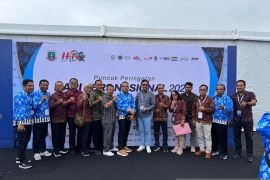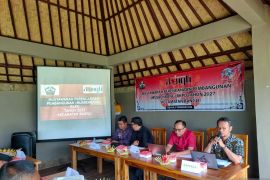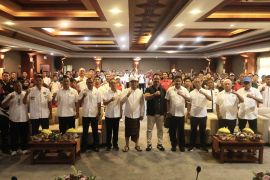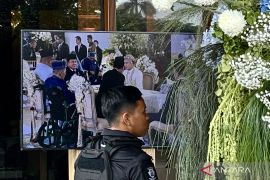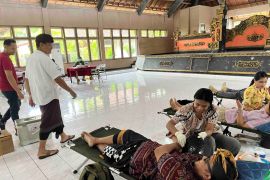Jakarta (Antara Bali) - Chairman of the Corruption Eradication Commission (KPK) Agus Rahardjo and other leaders of the anti-graft agency met President Joko Widodo (Jokowi) here on Monday.
"We met the president only for a consultation regarding the law (on the KPK) ," Rahardjo stated after the meeting, referring to the efforts by the House of Representatives (DPR) to revise Law No. 30 of 2002 on the KPK.
Several quarters believe that the revision of the law would weaken the anti-graft agency in its efforts to fight corruption in the country.
Rahardjo and other leaders of the KPK did not divulge any further information on their meeting with the head of state.
The leaders left the State Palace at about 10 a.m. local time before the president received the leaders of the Al Azhar University who were led by its Grand Syeikh Prof. Dr. Ahmed Mohamed Ahmed Eltayeb.
The chairman of the KPK stated on Sunday that he would resign if the DPR finally decided to revise the law on KPK.
"I am ready to resign if the law is revised. I will be the first person to resign" he remarked at a meeting of interfaith leaders organized to support the fight against corruption at the office of the Muhammadiyah Islamic organization.
He pointed out that more concrete steps were needed to fight corruption in the country as the situation has become critical.
On the occasion, Agus expressed gratitude to the religious leaders present at the event for their support to the institution that he leads.
"The KPK is thankful for the support from religious leaders of Muhammadiyah as well as those of Buddhism, Hinduism, Konghucu, and Catholicism faiths. Your position is clear that the revision will weaken and not strengthen KPK," he emphasized.
In response to Agus statement Muhammadiyah general chairman Dahnil Anzar Simanjuntak pledged that all religious councils would stand by the KPK.
"Religious councils are ready to fully support the strengthening of the KPK. We can make assurance that the revision must be stopped, so that Pak (Mr) Agus need not resign," he remarked.
Four points currently being discussed under the revision of the KPK law are limiting the anti-graft agencys authority to conduct wiretapping activities, to drop a case, to recruit its own investigators, and to establish an oversight committee.
The four points are being viewed to weaken the KPK, due to which increasingly more numbers of anti-corruption activists, academicians, and religious leaders have been strong opposing the revision. The government has been urged to reject the revision.
The revision effort is led by the Indonesia Democratic Party of Struggle (PDIP) and has been supported by six other party factions. Gerindra, Demokrat, and PKS are the only three political parties to have rejected the revision.(WDY)


